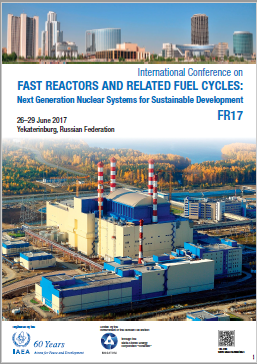Speaker
Mr
Andrey Gulevich
(SSC RF-IPPE)
Description
Reactor MBIR will start operating in the absence of loop channels, which represent technologically complex equipment. At the initial stage of operation this will make it possible, on the one hand, to develop technological modes of reactor facility operation with small amount of experimental devices, and on the other hand, with this development, to gradually fill the cells intended for the loop channels additional irradiation assemblies. For example, central loop channel occupies 7 cells in the center of the core. It is unreasonable to use all the seven cells for irradiation assemblies, because of their strong influence on each other. To eliminate this impact, it is possible to fill the central loop channel cells with three irradiation assemblies and four fuel assemblies.
To level the energy release, it is reasonable to install one more irradiation assembly in the core and compensate the critically loss by installing 4 additional fuel assemblies on the core periphery. Consequently, core at the initial stage of operation will consist of 85 fuel assemblies (93 assemblies in the design), 8 cells with CPS control rods and 21 irradiation assemblies.
Thus, the number of the irradiation cells can be increased from 17 to 21 at the initial stage of operation by eliminating central loop channel. Reactor power at this stage must be reduce from 150 to 137 MWt.
With this modification of the core, fuel with the design plutonium weight content is used, enabling transition to a design version of the core without changing the fuel assemblies design. For the same reason, the neutron flux and damaging dose in the irradiation assemblies at the initial stage of operation are almost the same as the design values.
The rate of damaging dose accumulation in the irradiation assemblies located in the core is from 16 to 16.7 dpa per micro-campaign (100 eff. days). Inner volume of one irradiation assembly is 2.28 l. General rate of damaging dose accumulation in the MBIR reactor at the initial stage of operation is 1370 dpa*l/year. In the BOR-60 reactor this parameter equals 300 dpa*l/year.
Country/Int. Organization
Russia/JSC “SSC RF – IPPE”
Author
Mr
Andrey Gulevich
(SSC RF-IPPE)
Co-authors
Mr
Aleksandra Tsarapkina
(JSC “SSC RF – IPPE”)
Mr
Dmitiy Klinov
(JSC “SSC RF – IPPE”)
Mr
Igor Tretyakov
(JSC "NIKIET")
Mr
Ivan Lukasevich
(JSC "NIKIET")
Mrs
Natalya Romanova
(JSC "NIKIET")
Mr
Vladimir Eliseev
(SSC RF-IPPE)
Mr
Vladimir Risovannyi
(JSC “Science and Innovation”)

